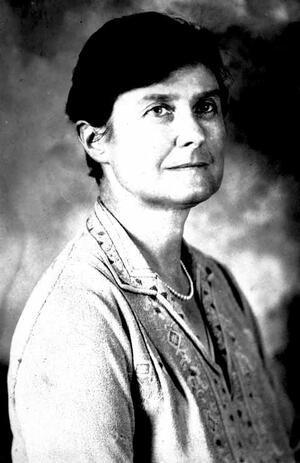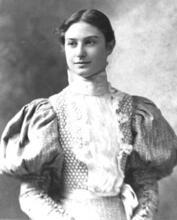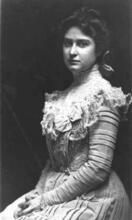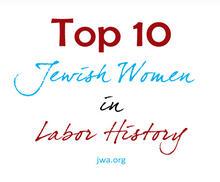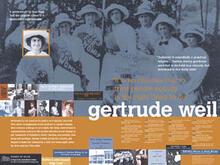Gertrude Weil
A dedicated activist for women’s rights and racial equality, Gertrude Weil showed that local, small-scale political action could have far-reaching effects. Deeply influenced by her education at Smith, Weil returned to her North Carolina hometown and founded a local suffrage association. She later established the North Carolina League of Women Voters and lobbied to reform labor laws to protect women workers in factories. Weil also dedicated herself early on to racial equality, bringing national attention to the rampant lynchings in the South. In the 1960s and 70s, she fought segregation, worked to integrate schools, and convened a biracial council in her home. Throughout her life, she dedicated herself to the problems that gripped the nation on a local level, transforming her town and her state.
Gertrude Weil’s career provides a rare example of southern Jewish social activism during the first half of the twentieth century. She was the first Jewish woman to lead a statewide secular women’s movement in North Carolina. Beginning with the controversial campaign for woman suffrage in 1915, Weil lobbied for numerous social causes such as protective labor legislation for women and children, voter education, and election reform. Gertrude Weil believed that women could be more influential social reformers through the direct means of politics rather than indirect influence. Her decision to associate herself with a relatively radical social and political agenda was unusual for a southern woman and even more uncommon for a southern Jew. Historically, southern Jews had stayed away from political or social causes that challenged southern norms for fear of anti-Semitic backlash. Weil, however, strayed from this norm, because she believed that women had a responsibility to participate in the political process.
Early Life and Education
Born in Goldsboro, North Carolina, on December 11, 1879, she was the oldest daughter of immigrant Henry Weil and first-generation American Mina (Rosenthal) Weil. The Weils had three other children, Leslie, Herman, and Janet. Of German Jewish descent, the Weils were prominent business and civic leaders in Goldsboro.
Gertrude Weil received a progressive formal education, which was unusual for a southern woman of her time. In 1894, at age fifteen, she was sent to New York City to attend the Horace Mann High School at Teachers College. After high school, she attended Smith College. In 1901, Gertrude Weil became the first North Carolinian to graduate from Smith.
Suffrage Movement
Although she wished to pursue a teaching career in New York City, family pressure persuaded her to return home to Goldsboro, where Weil first became involved in the women’s club movement. Continuing a family tradition, she was an active leader in her local sisterhood at Temple Oheb Shalom. In 1906, Weil joined the North Carolina Federation of Women’s Clubs, a nondenominational umbrella organization for the state’s clubwomen.
Over the next ten years, Weil became increasingly visible in the women’s club movement. In 1915, she was simultaneously offered executive positions in the North Carolina Federation of Women’s Clubs and the North Carolina Equal Suffrage League. Weil decided to devote her time and energy to the more controversial latter organization.
In the southern states, the argument for women’s direct participation in politics struck at the heart of southern, white cultural assumptions about womanhood and white supremacy. Antisuffragists argued that only “militant” women who wished to destroy American family life could support woman suffrage. They also exploited white southerners’ fears of enfranchising African Americans. And they appealed to the legislators on the basis of the states’ rights tradition. In response to these arguments, Gertrude Weil shrewdly based her pro-suffrage arguments on appeals to women’s responsibility as moral guardians of the home. Weil maintained that the mothers of America had a responsibility to participate in government for the sake of their children. The suffragists were ultimately unsuccessful. North Carolina was not among the four southern states that ratified the Nineteenth Amendment.
Other Activism
Weil’s role in the suffrage campaign set her apart from the majority of her fellow clubwomen. However, her leadership in this movement and those that she subsequently joined distinguished her from other southern Jews to an even greater degree. Although Jews in the South had always maintained a low political profile, this attitude was especially pervasive after the 1913 trial and lynching of Leo Frank, a Jew from Atlanta. Thus, it is surprising to find that only two years after Frank’s sensational murder, a Jewish woman from North Carolina directed a bitterly contested and high-profile suffrage campaign. Weil’s dedication to social reform, however, was a unique product of her education, her family position, and the strength of her personal conviction. These factors enabled and inspired Gertrude Weil to stand beside her beliefs despite adverse public reaction.
Throughout the next five decades of her life, Weil led organizations as varied as the North Carolina chapter for the League of Women Voters, the Goldsboro Community Chest (a Depression Era relief agency), the North Carolina Association of Jewish Women, and the North Carolina Interracial Committee. In 1964, Smith College recognized Weil’s “lifetime of service to the cultural, charitable, religious and political welfare” of North Carolina.
Gertrude Weil continued to be involved in North Carolina affairs until May 3, 1971, when she died, at age ninety-two, in the same Goldsboro home in which she had been born.
Geisberg, Heather. “Universal Sisterhood and Gertrude Weil: The Secular and Religious Organizational Activities of a Southern and Jewish Social Activist.” Honors thesis, Dartmouth College (1995).
Hyman, Bob. Obituary. Goldsboro (North Carolina) News-Argus, May 31, 1971.
Rountree, Moses. Strangers in the Land: The Story of Jacob Weil’s Tribe (1969).
Weil, Gertrude. Papers. College Archives, Smith College, Northampton, Mass., and State Department of Archives and History, Raleigh, N.C.

